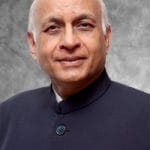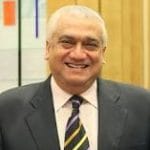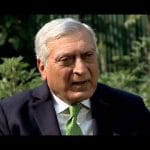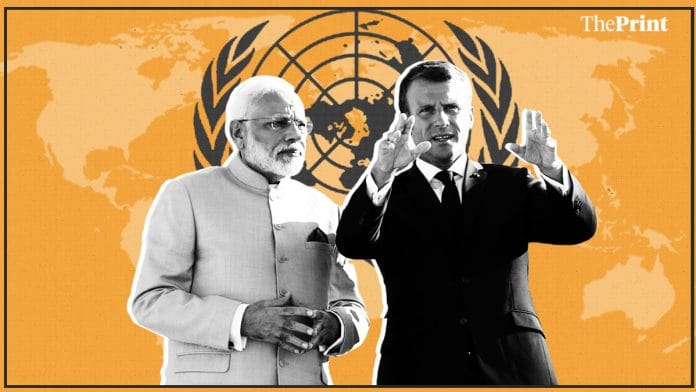Backing India’s stand on Jammu and Kashmir, French President Emmanuel Macron said it is a bilateral issue and no third party should interfere in the matter. Given US’ regular flip-flops on India-related issues, and Russia’s growing closeness with Pakistan, many experts see France as Narendra Modi-led India’s new ‘best friend’.
ThePrint asks: Modi-Macron embrace: Does India have permanent friends or is every alliance strategic?
India has a special equation with France, the only country not to condemn our 1998 nuclear tests
 Lalit Mansingh
Lalit Mansingh
Former Foreign Secretary and diplomat
This term ‘permanent friends’ must be credited to British statesman Henry John Temple, who said, “We have no eternal allies, and we have no perpetual enemies. Our interests are eternal and perpetual, and those interests it is our duty to follow.” The same applies for India. We have no permanent friends but we do have a fair number of friends in the international community.
One can analyse India’s foreign policy in two stages. In the beginning, right after Independence, there was a feeling that everyone is a friend in the international community. And the second phase began during Atal Bihari Vajpayee’s tenure, where the practice of building ‘strategic partnerships’ entered the scene.
India has 30-40 strategic partnership agreements, with countries like Afghanistan, the US, the UK and Japan. India’s strategic alliances are based on mutual interest, which is also the basis of its partnership with France.
India is keen on France because we have a special equation with them. France was the only country which did not condemn the nuclear tests in 1998 and subsequently did not slap any sanctions. At the same time, France knows that India is a top client for the purchase of military equipment. This mutual interest is reflected in the current joint agreement.
Both India and France maintain autonomy in decision making while building strong ties with other nations
 Arun Singh
Arun Singh
Former Indian Ambassador to the US
India has a strategic partnership with France since 1998. France was supportive of India in the context of the Kargil war as well as through subsequent supplies of high technology and defence equipment. There are no permanent friends or enemies, only permanent interests. Using the same logic, the strategic partnerships we have with different countries are based on convergence of interests.
France is India’s strongest partner in Europe, and among the strongest globally, in three areas of strategic significance – defence, space, and civil nuclear. After the Pulwama terror attack, France supported India. Recently, when China sought to raise the India-Pakistan issue at the United Nations, France opposed any formal meeting. France maintained that India-Pakistan differences should be handled bilaterally.
While being a part of the western alliance system, France strives to maintain strategic autonomy in its decision making. This has been exemplified in it taking different positions from the US on many issues, including on Iraq in 2003. Similarly, India too strives to maintain its autonomy while building a stronger relationship with the US, and the West in general. This similarity provides for convergence of interests and strategies between the two countries.
Lastly, France is also an Indian Ocean power with its presence in the Reunion Island, and has 6 million square kilometres of exclusive economic zone in the Indo-Pacific region. This is why the two countries have recently signed a joint document for cooperation in the Indian Ocean region, have an agreement on logistics support and have been carrying out the increasingly complex Varuna naval exercises.
Also read: France to Chidambaram – PM Modi now has almost complete control over all levers of power
India has a strategic partnership with more than 40 countries, which is sign of an unclear outlook
 Talmiz Ahmad
Talmiz Ahmad
Former diplomat
It is important to draw a distinction between a strategic partnership and an alliance. A strategic partnership brings together two countries that share a large space of common understanding with regards to important regional and global issues. The partnership here strengthens the two countries’ position globally.
An alliance is a formal coming together of two or more countries, after having given up their differences to arrive at an agreement. NATO and the Warsaw Pact are some examples. In the post-Cold War world, most alliances tend to carry defence or military characteristics. Traditionally, an alliance, in terms of international relations, hardly ever has a soft issue like climate change.
Nowadays, we have loose arrangements or agreements instead of alliances, where countries agree to support each other on a specific issue. For example, both India and China have concerns about the US’ trade policy, so they both have agreed to work together on this.
India has a strategic partnership with over 40 countries, hinting at an unclear outlook. The term “strategic partnership” is used very loosely in India, unlike other countries.
France and India were partners in setting up the International Solar Alliance. There is common ground in economic, cultural, and educational fields. The Rafale deal further opened up the area of defence.
However, our interests don’t align. Frances’ priority is in the EU, Russia, and the US, whereas our interests are with Southeast Asia, China, Russia and the Indian Ocean. Just because we agree on climate change and have strong bilateral ties doesn’t mean we are strategic partners in the strict understanding of the term.
The relationship between India and France can be classified as a strategic partnership purely because New Delhi chooses to define it so loosely.
France was the first western country with which India instituted a strategic dialogue and partnership
 Kanwal Sibal
Kanwal Sibal
Executive Council Member, VIF, and Former Foreign Secretary
It is a well-known adage that countries have permanent interests not permanent friends. Each country gives primacy to its national interests and if the interests of two countries converge, friendship can appear “permanent”. But if interests diverge, differences can emerge.
France was the only country that refused to impose sanctions on India after our 1998 nuclear tests. It was the first western country with which we instituted a strategic dialogue and with which we established a strategic partnership. France, like us, believes in strategic autonomy.
We have been partners in many critical areas: defence, space, nuclear energy. Our trade and investment ties are significant.
Leaders of no other country have been invited as frequently as those of France gor our Republic Day celebrations, which symbolises the affinity between the two countries.
France supports India on issues related to terrorism. On recent constitutional changes in Jammu and Kashmir, France supported us in the UNSC. We have a shared strategic vision today for the Indian Ocean region. Our cooperation in the domain of maritime security is expanding. PM Narendra Modi and French President Emmanuel Macron have together launched the International Solar Alliance, as part of countering the looming problem of climate change. The personal chemistry between the two leaders is apparent.
Also read: In Modi era, France has replaced Russia as India’s new best friend
Neither is Russia a reliable friend nor is US a fickle one. Nation-states have semi-permanent interests
 Pranay Kotasthane
Pranay Kotasthane
Head of research, Takshashila Institution
There are no friends, let alone permanent friends when it comes to international relations. Anthropomorphism in international conduct can lead us to incorrect assumptions and solutions. So, neither is Russia a reliable friend of India nor is the United States a fickle one. However, what can be said is that nation-states do have semi-permanent interests.
It is in India’s interest to have a better relationship with France for two reasons. First, it ensures that the European Union’s policy towards India remains favourable. It is far more advantageous to deal with individual European states than with the European Union. Second, strategic engagement with France — inclusive of defence purchases — is a way to secure its support for Indian positions at the United Nations Security Council.
Going ahead, diversification of the trade relationship with a key defence supplier like France is critical for India. A diverse partnership provides levers to hedge against changing geopolitical equations. Maritime co-operation, the International Solar Alliance, and nuclear energy trade illustrate this overlap of French and Indian interests.
Better economic & people-to-people relations needed to buttress strategic ties with France in long run
 Dhruva Jaishankar
Dhruva Jaishankar
Fellow of Foreign Policy, Brookings India
There are no permanent friends in international politics, only permanent interests. That said, the last two decades have witnessed a remarkable convergence of interests between India and France, to the point that Paris may today be India’s most important strategic relationship in Europe.
France was an early advocate of lifting sanctions on India following the 1998 nuclear tests, before the United States or Russia came around to that view. Today, the India-France relationship consists of substantive cooperation in three strategic areas: defence, space, and civil nuclear energy.
In the defence realm, not only is France an important supplier of defence equipment, but there is also cooperation on homeland security, intelligence-sharing, cyber security, and importantly on maritime security. As a manifestation of the latter, the two have signed a reciprocal logistics agreement, and with French assets in the southwest Indian Ocean, cooperation in access and maritime domain awareness is natural.
In the long-run, to buttress these strategic ties, far better economic and people-to-people relations will be necessary, and attempts are being made to overcome some of the constraints of language and culture.
No permanent friends but only ‘issue-based’ alliances is essentially the return of global anarchy
 Srijan Shukla
Srijan Shukla
Journalist, ThePrint
In global politics, an alliance is intrinsically strategic. The realist school of international relations has no concept of ‘friendship’. Nation-states ally with each other based on only some form of mutual interests. In that sense, every alliance India has, or might have in the future, should be seen as only‘strategic’.
Let’s consider the case of the emerging alliance between India and France. With London in disarray and Angela Merkel’s power waning in Berlin, France’s Emmanuel Macron has emerged as the most prominent European leader. For Prime Minister Narendra Modi, it only makes sense to develop a close relationship with the French president. Never mind the Rafales and the UN Security Council veto power.
France is a power that likes to constantly punch above its weight. The French grand strategy envisages a major role for itself in the Indian Ocean region and the new Asian order. India is France’s best bet to achieve that.
Friendship is a hotly debated topic in academic circles. A theoretical embodiment of that is the ‘democratic peace theory’, which argues that democracies never wage a war against each other.
Although no democracies are at war today, there are sufficient cases of economic or security conflicts, such as the recent South Korean-Japanese conflict.
Such conflicts between democratic states were fewer in number until a decade ago. But as realist scholar Robert Kagan argues, when the world order dies, the global anarchy re-emerges. During such anarchy, brute self-interest is the only driving principle.
When India’s new Foreign Minister S. Jaishankar talks about “no permanent” but only “issue-based” alliances, he is essentially talking about the return of global anarchy.
By Taran Deol and Revathi Krishnan







The premise of this article is really vacuous. To posit friendship and strategic alliances as two opposites or a binary choice is idiocy. Nation-states are an intangible concept. To apply the notion of friendship to such entities is anthropomorphism gone wild. Friendship means sitting together and having a beer. Can you picture India having a beer with another country? Friendship also means sacrificing your self- interest for the sake of another. Is it possible to imagine a country sacrificing it’s interest? It’s possible to imagine politicians or bureaucrats doing it, especially when money changes hands, but a country? I will say nothing about the comments except that a stupid question deserves stupid answers and this question gets them.
Over time, the interests and concerns of two states can converge so substantially that friendship – of the sort splitting a beer implies – is possible. That is how special relationships, Britain and the US for a century, Japan and the US since 1945, are created. There are differences, divergences, but the overarching commonality subdues them. Some had hoped India and the United States could have forged that sort of association. However, I think that lies far in the future, we have a lot of ground to cover domestically before we can get there. It is now fashionable to argue that everything is transactional, like a one night stand. That too is an extreme view. There are several countries, starting with south and south east Asia where India can create enduring friendships. 2. Have invested a little effort to persuade you that I am not really a stupid person …
Forty strategic partnerships is at least thirty five too many. It denudes the term of gravitas. Whether Israel or France – despite the enormous difference in the global weight of the two states – there is a mutually beneficial relationship, with arms purchases an important component. No major points of disagreement, although Israel has the potential to undermine other important relationships we have. A UNSC veto is something France could provide. 2. The real value of associating more closely with advanced economies like France is in terms of trade, investment, access to technology. Unfortunately, India is underperforming on its economic growth on an epic scale. Too much of our diplomacy is now centres on : Are you with us or with Pakistan ? It diminishes us to frame that question. Why should it matter one unbuttered croissant whether France “ supports “ our stand on Kashmir …